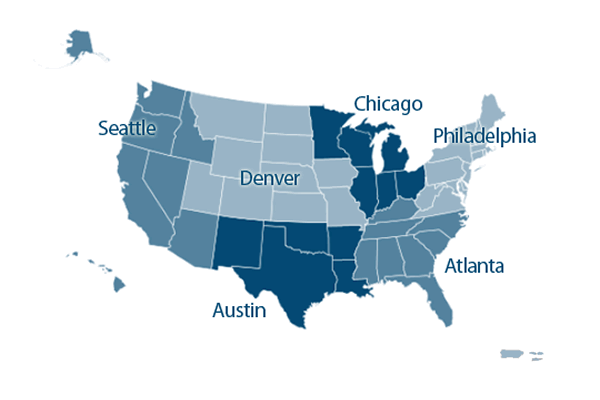Overview
Useful Links
MISSION
To lead the federal economic development agenda by promoting innovation and competitiveness, preparing American regions for growth and success in the worldwide economy.
The U.S. Economic Development Administration's investment policy is designed to establish a foundation for sustainable job growth and the building of durable regional economies throughout the United States. This foundation builds upon two key economic drivers - innovation and regional collaboration. Innovation is key to global competitiveness, new and better jobs, a resilient economy, and the attainment of national economic goals. Regional collaboration is essential for economic recovery because regions are the centers of competition in the new global economy and those that work together to leverage resources and use their strengths to overcome weaknesses will fare better than those that do not. EDA encourages its partners around the country to develop initiatives that advance new ideas and creative approaches to address rapidly evolving economic conditions.
Value Proposition Statement
Read EDA's Value Proposition Statement.
EDA’S ROLE
As the only federal government agency focused exclusively on economic development, the U.S. Department of Commerce’s Economic Development Administration (EDA) plays a critical role in facilitating regional economic development efforts in communities across the nation.
Guided by the basic principle that sustainable economic development should be locally-driven, EDA works directly with communities and regions to help them build the capacity for economic development based on local business conditions and needs. EDA’s grant investments in planning, technical assistance, and infrastructure construction are designed to leverage existing regional assets to support the implementation of economic development strategies that make it easier for businesses to start and grow.
EDA’s flexible programs and structure enable nimble operations and allow for innovation and responsiveness to changing economic needs and conditions faced by its local and state government partners. Grants made under these programs are designed to leverage existing regional assets to support the implementation of economic development strategies that advance new ideas and creative approaches to advance economic prosperity in distressed communities.
EDA provides economic development financial assistance to communities so they can encourage innovation and entrepreneurship in a way that works best for them. Through its network of regionally-based staff and portfolio of flexible grant tools, EDA helps communities experiencing economic distress, take control of their future and position themselves for economic prosperity and resiliency.
In addition, EDA leads the integration of economic development resources from all sources, including federal, state, local and philanthropic, to achieve better outcomes for communities across America.
EDA Regional Office Structure
EDA customers are served by six regional offices.

Atlanta Regional Office
Alabama, Florida, Georgia, Kentucky, Mississippi, North Carolina, South Carolina, Tennessee
Austin Regional Office
Arkansas, Louisiana, New Mexico, Oklahoma, Texas
Chicago Regional Office
Illinois, Indiana, Michigan, Minnesota, Ohio, Wisconsin
Denver Regional Office
Colorado, Iowa, Kansas, Missouri, Montana, North Dakota, Nebraska, South Dakota, Utah, Wyoming
Philadelphia Regional Office
Connecticut, Delaware, District of Columbia, Maine, Maryland, Massachusetts, New Hampshire, New Jersey, New York, Pennsylvania, Rhode Island, Vermont, Virginia, West Virginia, Puerto Rico, Virgin Islands
Seattle Regional Office
Alaska, Arizona, California, Hawaii, Idaho, Nevada, Oregon, Washington, American Samoa, Northern Mariana Islands, Guam, Federated States of Micronesia, Rep. of Marshall Islands, Rep. of Palau





